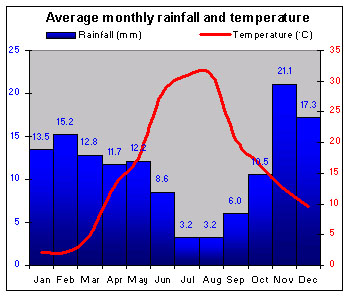COUNTRY INFORMATION |
Introduction |
Lying at the southeastern end of the Adriatic Sea, opposite the heel of Italy, Albania is a poverty-stricken, mountainous country which became a one-party communist state in 1944. The "land of the eagles," as it is known locally, first held multiparty elections in 1991. Economic collapse provoked uprisings and virtual anarchy in 1997, and the country was only stabilized by the intervention of OSCE troops. |
|
Climate |
 |
The coastal climate is Mediterranean, but rather wet in winter. Heavy rain or snow falls in winter in the mountains. |
|
People |
| Languages |
Albanian, Greek |
|
| URBAN/RURAL POPULATION DIVIDE |
|
|
|
The existence of ethnic minorities in Albania was only officially acknowledged in 1989. The Greek minority strongly contests these statistics, which state that 98% of the population are Albanian. Located mainly in the south and identifying with Athens rather than Tirana, the Greeks claim to make up 10% of the population. They suffer considerable discrimination. Under communism, Albania was the only officially atheist state in the world. Many Albanians maintained their beliefs in private. Religious worship is now permitted and mosques have reopened. Society is traditional and male-dominated. The extended family remains a strong influence. In 1999 the country temporarily sheltered nearly half a million ethnic Albanian refugees fleeing "ethnic cleansing" in neighboring Kosovo. |
|
Economy |
| GNP (US$) |
3833
|
M |
GNP World rank |
122
|
|
| Inflation |
0 |
% |
Unemployment |
16 |
% |
|
StrengthsOil and gas reserves. Significant economic growth achieved since 1997 collapse. Progress with privatization. WeaknessesRudimentary public services and energy, transportation, and water networks. Pyramid schemes wiped out savings. |
|
Politics |
| Lower house |
Last election |
2001 |
Next election |
2005 |
| Upper house |
Last election |
Not applicable |
Next election |
Not applicable |
|
Albania was dominated for more than 40 years by communist ruler Enver Hoxha, who died in 1985. An exodus of Albanians in 1991 finally persuaded the regime to call multiparty elections. The resulting center-right coalition failed, however, to create a Western-style liberal state. Many people were ruined by investing in "pyramid" savings schemes which collapsed in 1997, prompting a rebellion in the south and forcing the government to resign. The new coalition led by the socialist PSS won elections later that year, and a further term in 2001, as Prime Minister Ilir Meta claimed credit for restoring a measure of security and hope. The poll, though disputed by the PD, was praised internationally as the fairest yet. In 2002 the PSS was wracked by internal disputes. By July, party leader Fatos Nano had won through to become prime minister. |
|
Resources |
| Minerals |
Chromium, oil, coal, natural gas, copper, nickel |
|
| Oil reserves (barrels) |
183m barrels |
Oil production (barrels/day) |
7378 b/d |
|
Albania needs huge capital investment to develop its minerals and to create a modern electricity supply system. |
|
Health |
| Life expectancy |
73 |
Life expect. World rank |
51 |
| Population per doctor |
769 |
Infant mortality (per 1000 births) |
20 |
|
|
|
| Principal causes of death |
Heart, respiratory, and digestive diseases, cancers |
|
The health service is rudimentary, and dependent on Western aid for most drugs and medical supplies. |
|
Education |
| Literacy |
85 |
% |
Expend. % GNP |
3 |
%
|
|
| PERCENTAGE OF POPULATION IN FULL TIME EDUCATION |
|
| Primary |
100 |
% |
Secondary |
38 |
% |
Tertiary |
12 |
% |
|
The system is derived from the Soviet, Chinese, and Italian models. Albania has eight universities. |
|
Wealth |
| Cars |
29 |
per 1,000 population |
| Telephones |
39 |
per 1,000 population |
| Televisions |
123 |
per 1,000 population |
|
Wealth is limited to a few private-sector entrepreneurs. Poverty is worst in northern rural areas but also acute in slum settlements around Tirana and other cities.
|
History |
Albania gained independence in 1912 for the first time in its history. - 1924–1939 Ahmet Zogu in power. Crowned King Zog in 1928.
- 1939–1943 Occupied by Italy.
- 1944 Communist state; led by Enver Hoxha until 1985.
- 1991 First multiparty elections.
- 1997 Economic chaos as failure of pyramid schemes causes revolt.
- 1999 Refugee influx from Kosovo.
- 2001 PSS wins second term.
|
|